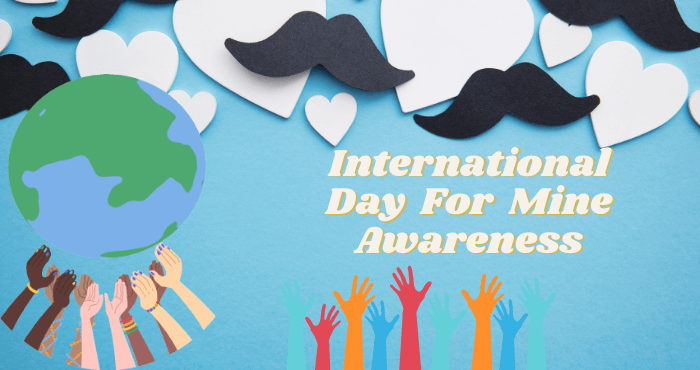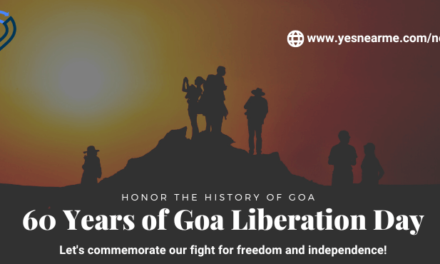International day for mine Awareness
 International Day for Mine Awareness and Assistance in Mine Action is observed every year on April 4th to raise awareness about the dangers posed by landmines and to promote efforts to eliminate them worldwide. The day emphasizes the importance of mine clearance as well as the support needed for survivors and affected communities.
International Day for Mine Awareness and Assistance in Mine Action is observed every year on April 4th to raise awareness about the dangers posed by landmines and to promote efforts to eliminate them worldwide. The day emphasizes the importance of mine clearance as well as the support needed for survivors and affected communities.
Landmines are explosive devices designed to be placed on or just under the ground, often during armed conflict. These mines pose a significant threat long after conflicts have ended, continuing to cause death, injury, and displacement for years. The International Day for Mine Awareness not only calls attention to the tragic consequences of landmines but also highlights the global efforts toward their removal, rehabilitation of survivors and the promotion of policies aimed at preventing further harm.
Established by the United Nations in 2005, this day serves as a reminder of the work being done by governments, organizations and individuals to reduce the global burden of landmines. It encourages collaboration and reinforces the need for continued mine action, including demining operations, mine risk education and victim assistance.
On this day, various activities such as public awareness campaigns, educational programs and advocacy efforts are organized worldwide to draw attention to the challenges faced by communities affected by landmines. The goal is to encourage global efforts toward a mine-free world where people can live in safety and peace.
Mosul: International day for mine Awareness.
Mosul, a city in northern Iraq, serves as a stark reminder of the devastating impact of landmines and unexploded ordnance (UXO) following years of intense conflict, particularly the battle to reclaim the city from ISIS in 2017. During and after the battle, the city became heavily contaminated with landmines, roadside bombs, and other explosive remnants of war, which continue to pose a grave threat to civilians, hampering recovery efforts and obstructing the safe return of displaced populations.
April 4th, International Day for Mine Awareness and Assistance in Mine Action, is particularly poignant for Mosul, as it underscores the urgent need for mine clearance, risk education, and victim assistance in cities and regions like Mosul that are recovering from prolonged conflict. The day calls attention to the humanitarian crisis caused by landmines and reminds the international community of the importance of supporting mine action efforts to ensure that people can safely rebuild their lives and communities.
The Situation in Mosul
After the liberation of Mosul from ISIS in 2017, it was discovered that the city was one of the most heavily contaminated urban areas in the world due to mines and explosives. Many residents who had fled their homes found that their return was hindered by the presence of landmines in their neighborhoods, schools, and agricultural lands. The clearance process is slow and dangerous, requiring sophisticated technology and highly trained personnel to remove mines safely and efficiently.
The threat posed by landmines in Mosul has led to the establishment of numerous mine action programs by organizations like the UN Mine Action Service (UNMAS), the International Committee of the Red Cross (ICRC), and local demining groups. These programs focus on removing mines, educating the public about the risks of unexploded ordnance, and providing medical and psychological support to survivors.
Why It Matters for Mosul
The International Day for Mine Awareness is especially significant for Mosul because it highlights not just the physical dangers posed by landmines, but also the social and economic challenges they create. People in affected areas like Mosul face limited access to education, healthcare, and resources as long as these deadly remnants of war remain in place. Clearing mines is a key step toward rebuilding communities, restoring livelihoods, and allowing people to live in peace once again.
The Role of Global Efforts
The International Day for Mine Awareness aims to mobilize global action toward the goal of a mine-free world. For Mosul and other mine-affected regions, the day serves as a reminder of the international solidarity needed to address the lasting consequences of conflict. The United Nations and other international partners continue to provide critical support in mine clearance, victim assistance, and community rehabilitation. However, the situation remains challenging, and continued advocacy is necessary to ensure that the efforts to clear Mosul and similar areas are adequately funded and prioritized.
Links
Photo Gallery
Implementation Support Unit of the Convention on the Prohibition of the Use, Stockpiling, Production, and Transfer of Anti-Personnel
Mines and on Their Destruction
International Campaign to Ban Landmines (ICBL)
Center for International Stabilization and Recovery (CISR-JMU)
Global Advocate: International day for mine Awareness

April 4th, the International Day for Mine Awareness and Assistance in Mine Action, serves as a global call to action, highlighting the urgent need to raise awareness about the devastating effects of landmines and unexploded ordnance (UXO) and to advocate for their removal, while supporting victims and survivors. The day emphasizes the importance of global collaboration in addressing the long-term consequences of landmines, especially in post-conflict regions where these remnants of war continue to cause death, injury, and displacement.
As a Global Advocate for the International Day for Mine Awareness, the focus is on bringing global attention to the efforts of demining organizations, victim assistance programs, and advocacy initiatives that work tirelessly to make affected areas safe again. This role involves not only recognizing the plight of landmine-affected communities but also advocating for effective policy changes, funding, and international support to combat the dangers posed by these deadly devices.
Why Global Advocacy Matters
Landmines and unexploded ordnance continue to pose a threat to millions of people worldwide, especially in countries that have experienced conflict. In countries like Syria, Afghanistan, South Sudan, Angola, Cambodia, and Iraq (including Mosul), landmines are remnants of past wars that continue to claim lives, particularly among children and innocent civilians. These hidden explosives hinder humanitarian aid, prevent people from returning to their homes, and create barriers to reconstruction and development. The International Day for Mine Awareness provides a platform for advocates to amplify the voices of affected communities and push for a safer, mine-free world.
Key Actions for Global Advocacy
-
Raising Awareness
- Advocates work to raise global awareness about the dangers of landmines and the need for action to clear affected areas. This involves organizing campaigns, public events, and digital initiatives that bring attention to the devastating impact of landmines. Social media, documentaries, and reports serve as tools to share stories of survivors and communities struggling with the legacy of conflict.
-
Supporting Demining Operations
- A critical part of global advocacy is ensuring continued support for demining efforts. Clearing landmines is a complex and dangerous process that requires specialized training, equipment, and funding. Global advocates call on governments, international organizations, and donors to provide the necessary resources to fund mine clearance projects and to support organizations like the United Nations Mine Action Service (UNMAS), the International Campaign to Ban Landmines (ICBL), and The Halo Trust, which are actively involved in removing mines from affected regions.
-
Empowering Victims and Survivors
- Advocacy also focuses on the importance of providing long-term support for survivors of landmine accidents. This includes medical care, rehabilitation, psychosocial support, and economic assistance to help victims rebuild their lives. Global advocates push for policies that ensure equal rights and opportunities for landmine survivors, who often face significant barriers to education, employment, and social participation.
-
Advocating for the Ottawa Treaty and International Cooperation
- The Ottawa Treaty (Mine Ban Treaty), signed in 1997, is a key international agreement that seeks to eliminate landmines globally. Global advocates work to strengthen international cooperation by encouraging more countries to sign and adhere to the treaty, ensuring its goals of eliminating landmines are met. Advocates also encourage accountability for those who violate international humanitarian laws regarding the use of landmines.
-
Promoting Education and Risk Awareness
- Mine risk education plays a crucial role in keeping communities safe. Advocates help to promote mine risk education programs that teach people, especially children, how to identify and avoid landmines and unexploded ordnance. Through schools, community outreach, and media campaigns, these programs aim to prevent accidents in regions still contaminated by landmines.
The Role of Global Advocacy on the International Day for Mine Awareness
On April 4th, the International Day for Mine Awareness serves as a pivotal moment for advocates to reflect on the progress made and the challenges ahead in the fight against landmines. It is a day to celebrate the achievements of those working in mine action, honor the survivors, and renew the global commitment to a mine-free world.
Global advocacy on this day involves:
- Organizing events like conferences, exhibitions, and public rallies to bring attention to the issue of landmines and the ongoing efforts to clear contaminated areas.
- Promoting partnerships between governments, the private sector, NGOs, and affected communities to create a unified approach to mine action.
- Highlighting success stories, such as the clearing of formerly mine-contaminated areas, the rehabilitation of survivors, and the policy progress made in the fight against landmines.
Global Issues: Peace and Security
Peace and security are fundamental aspects of human well-being, prosperity, and stability, yet they remain some of the most significant challenges in the world today. The struggle for lasting peace is at the core of many global issues, ranging from armed conflict and terrorism to human rights violations and the impacts of climate change. Ensuring peace and security is not only about the absence of war but also about addressing the root causes of conflict, fostering stability, and ensuring that communities thrive in an environment of cooperation and trust.
Key Global Issues Affecting Peace and Security
1. Armed Conflicts and Wars
- Ongoing conflicts, such as those in Syria, Yemen, South Sudan, Ukraine, and parts of Africa, continue to devastate millions of lives. These wars not only result in loss of life but also cause long-term displacement, economic damage, and infrastructure destruction. The international community has a critical role in promoting diplomacy, peacebuilding efforts, and supporting post-conflict reconstruction.
2. Terrorism and Violent Extremism
- Terrorist organizations such as ISIS, Al-Qaeda, and others have posed significant threats to global peace and security. Their tactics, including suicide bombings, kidnapping, and attacks on civilians, exacerbate instability, fuel fear, and disrupt societies. Addressing violent extremism involves a multi-faceted approach, including combating radicalization, promoting inclusive governance, and preventing the spread of extremist ideologies.
3. Human Rights Violations
- Human rights abuses often serve as the backdrop for conflicts and instability. In many parts of the world, populations face oppression, discrimination, and violence. Genocide, ethnic cleansing, forced displacement, and gender-based violence are among the human rights violations that exacerbate insecurity and hinder peaceful development. Ensuring accountability for perpetrators of human rights abuses and promoting international human rights norms are critical steps to achieving peace.
4. Refugee Crises and Displacement
- The displacement of people due to armed conflicts, persecution, or climate change is a growing issue that affects global security. Over 100 million people worldwide are currently displaced, seeking refuge in other countries. This places tremendous pressure on neighboring nations and the international community, requiring coordinated humanitarian aid, safe resettlement programs, and long-term solutions to the root causes of displacement.
5. Climate Change and Environmental Security
- Climate change is increasingly recognized as a threat multiplier that exacerbates conflict and insecurity. Rising sea levels, extreme weather events, and resource scarcity (especially in areas dependent on agriculture) can heighten tensions over water, food, and land. The climate-conflict nexus highlights the importance of addressing environmental degradation in peace and security discussions. Sustainable development and climate resilience are integral to fostering long-term peace.
6. Nuclear Proliferation
- The spread of nuclear weapons poses a critical threat to global security. While international efforts such as the Non-Proliferation Treaty (NPT) seek to curb the development of nuclear weapons, concerns about countries like North Korea and Iran developing or advancing their nuclear capabilities continue to fuel tensions. Preventing the spread of nuclear weapons and promoting disarmament are crucial for global peace and stability.
7. Cybersecurity and Information Warfare
- In the modern world, the threat to peace and security is not only physical but also digital. Cyber-attacks, information warfare, and online disinformation campaigns have the potential to destabilize governments, disrupt economies, and incite violence. Protecting critical infrastructure, securing digital communication channels, and ensuring the ethical use of technology are central to maintaining global security in the digital age.
8. Disarmament and Arms Control
- The global trade in arms and military equipment fuels conflicts and contributes to insecurity. Initiatives such as the Arms Trade Treaty (ATT) and efforts to ban landmines and cluster munitions are crucial for reducing the availability of weapons that fuel violence. Small arms and light weapons are particularly destructive in low-intensity conflicts and often lead to prolonged violence.
The Role of International Organizations in Promoting Peace and Security
1. The United Nations (UN)
- The UN plays a central role in global peace and security through its Security Council, which is responsible for addressing threats to international peace. The UN also deploys peacekeeping missions, facilitates diplomatic negotiations, and coordinates humanitarian aid to conflict-affected regions. The UN’s specialized agencies, such as the World Food Programme (WFP) and the World Health Organization (WHO), support recovery efforts in post-conflict areas.
2. Regional Organizations
- Regional organizations like the European Union (EU), African Union (AU), and Organization of American States (OAS) play an essential role in preventing conflict, mediating disputes, and promoting regional stability. The African Union, for example, has deployed peacekeeping forces in places like Darfur and Somalia.
3. Humanitarian and Civil Society Organizations
- Non-governmental organizations (NGOs) and humanitarian organizations, such as the International Red Cross (ICRC), Amnesty International, and Human Rights Watch, advocate for human rights, provide emergency relief, and support conflict resolution efforts. Civil society actors are instrumental in fostering dialogue, building trust, and ensuring that marginalized voices are heard in peace negotiations.
Achieving Global Peace and Security: Key Solutions
-
Conflict Prevention and Diplomacy
- Preventing conflicts before they erupt is the most effective way to ensure lasting peace. Early warning systems, mediation, and diplomatic dialogue between parties can help resolve disputes before they escalate into violence.
-
Inclusive Governance and Justice
- Promoting inclusive political systems and ensuring that all groups, especially minorities and marginalized communities, have a voice in decision-making processes can help reduce tensions and prevent conflict. Transitional justice mechanisms are necessary to address the grievances that fuel conflict and ensure accountability for past atrocities.
-
Sustainable Development
- Sustainable economic development, access to education, poverty alleviation, and job creation are essential for long-term peace and stability. Investment in healthcare, infrastructure, and human capital can reduce the drivers of conflict.
-
International Cooperation
- Peace and security cannot be achieved by one country alone. Multilateral cooperation and strengthened international laws are crucial in tackling global threats. Initiatives like arms control, peacekeeping missions, and humanitarian assistance require coordinated global action.
United Nations Mine Action Service (UNMAS)
The United Nations Mine Action Service (UNMAS) is a vital component of the United Nations (UN) system, working to reduce the threat posed by landmines, unexploded ordnance (UXO), and other explosive remnants of war (ERW) around the world. Established in 1997, UNMAS aims to support countries in their efforts to protect civilians, facilitate humanitarian relief, and restore development by addressing the dangers posed by these weapons. Its work is critical in post-conflict regions where landmines and unexploded ordnance remain a legacy of past wars and armed conflicts.
Objectives and Mandate of UNMAS
-
Mine Clearance and Demining Operations:
- UNMAS coordinates and supports mine action operations in countries affected by landmines and other explosive remnants of war. These operations involve the clearance of contaminated land, allowing for the safe return of displaced persons, restoration of agriculture, and rebuilding of infrastructure.
- The organization works with national governments and international organizations to clear landmines from crucial areas, including roads, schools, hospitals, and agricultural fields.
-
Mine Risk Education:
- Mine Risk Education (MRE) is an essential part of UNMAS’s work. They provide education to vulnerable populations, particularly children and displaced persons, to raise awareness about the dangers of landmines and unexploded ordnance. MRE programs teach people how to recognize and avoid these deadly remnants and encourage reporting of dangerous items to authorities.
-
Victim Assistance:
- UNMAS is committed to supporting survivors of landmine and explosive ordnance accidents. This includes facilitating medical care, rehabilitation, and psychosocial support for victims, as well as advocating for long-term care and social integration of survivors.
-
Policy and Advocacy:
- UNMAS advocates for global efforts to reduce the use of landmines and to promote international agreements, such as the Ottawa Treaty (Mine Ban Treaty), which aims to eliminate the use, stockpiling, and trade of landmines.
- The organization also works with various stakeholders, including governments, non-governmental organizations (NGOs), and the private sector, to ensure resources and attention are devoted to mine action.
-
Coordination and Support for Mine Action Operations:
- UNMAS works closely with other UN entities, local governments, and non-governmental organizations to coordinate mine action efforts. In conflict or post-conflict situations, it provides technical expertise and logistical support for landmine clearance, victim assistance, and training.
Global Impact and Reach of UNMAS
UNMAS operates in many countries that are dealing with the aftermath of armed conflict. Some of its active mission areas include:
- Syria: UNMAS works in Syria to clear landmines and unexploded ordnance left behind by the ongoing conflict. The safety of civilians, humanitarian access, and reconstruction efforts rely heavily on clearing these hazards.
- Afghanistan: With one of the highest rates of landmine contamination in the world, Afghanistan is a focus area for UNMAS. Its work helps improve safety and support the return of displaced populations.
- South Sudan: In South Sudan, where landmines continue to pose significant risks to civilians and disrupt agriculture, UNMAS plays a critical role in landmine clearance and providing assistance to those affected by these remnants of war.
- Iraq: UNMAS assists with the clearance of landmines and explosive remnants of war, particularly in cities like Mosul, which became heavily contaminated during the battle to liberate it from ISIS.
- Democratic Republic of the Congo (DRC): UNMAS supports ongoing mine action efforts in DRC, where landmines continue to affect civilian populations, disrupt humanitarian efforts, and impede development.
Approach and Methodology
-
Surveying and Assessing Risks:
- UNMAS begins by conducting detailed surveys of affected areas to determine the extent of mine contamination and identify the areas that pose the greatest risks to civilians. This helps prioritize clearance efforts.
-
Safe Removal of Landmines:
- Demining teams use specialized equipment and techniques to safely remove landmines and unexploded ordnance. This process often involves manual demining or the use of mechanized tools to clear the land without triggering any explosions.
-
Data Management:
- UNMAS collects and manages data related to landmine contamination. This data is used to track progress in mine clearance and help guide future operations. It also assists in monitoring and ensuring that cleared areas remain safe for civilian use.
-
Partnerships:
- UNMAS collaborates with a wide range of partners, including governments, NGOs, and other UN agencies. This cooperation ensures that mine action efforts are as efficient and effective as possible. Partners in demining efforts include organizations such as the Halo Trust, Norwegian People’s Aid (NPA), and MAG (Mines Advisory Group).
The Ottawa Treaty and UNMAS’s Role in Global Mine Action
UNMAS plays a pivotal role in promoting the Ottawa Treaty, also known as the Mine Ban Treaty, which was signed in 1997 and entered into force in 1999. The treaty aims to eliminate landmines worldwide and has been signed by over 160 countries.
UNMAS advocates for the universalization of the treaty and works to ensure that signatory countries comply with its provisions. The treaty bans the use, production, and stockpiling of anti-personnel mines and calls for the destruction of existing stockpiles. It also obligates states to assist victims and address the environmental impact of landmines.
Challenges and Future Goals
Despite significant progress, challenges remain:
- Ongoing Conflicts: In regions experiencing ongoing conflict, landmines continue to be used, creating barriers for peace and development.
- Funding Shortages: Mine action is an expensive process, and while progress is being made, funding for these efforts remains inadequate in many areas.
- Access and Security: In some regions, mine clearance operations are hindered by ongoing security concerns, making it difficult to reach contaminated areas.
Looking forward, UNMAS aims to continue advocating for a mine-free world, providing technical expertise, facilitating capacity-building in national mine action programs, and helping to create a safe environment for communities to rebuild their lives.
Why do we mark International Days?
to read more article do visit this link RA Awareness Day
And to know more about this visit un.org







Recent Comments